
 Christopher Williams
The Hockey Writers
Christopher Williams
The Hockey Writers
33
Reads
0
Comments
Ovechkin’s Decade as Capitals’ Captain
A new era dawned on Washington, D.C. a decade ago yesterday. Three days before the start of 2010, team captain Chris Clark had been traded to the Columbus Blue Jackets alongside defenseman Milan Jurcina in exchange for winger Jason Chimera. With Clark in Ohio and the captaincy left vacant, then-head coach Bruce Boudreau and general manager George McPhee were left with the responsibility of naming a new captain—the 14th of their franchise.
As he took to the Verizon Center ice for warmups against the Montreal Canadiens on Jan. 5, 2010, fans noticed something different about Alex Ovechkin: the alternate captain’s “A” traditionally sewn onto his jersey was replaced with a “C.” For the first time in his five-year NHL career, the 24-year-old was named the captain of the Capitals. There was no announcement made by the organization, leaving the hockey world to learn about the news at game time. He was already an established superstar and league-leading goalscorer, but could Ovechkin evolve into the all-around player and leader on and off the ice that the team needed him to be?
Ovechkin’s tenure as captain has consisted of ups and downs, to say the least. Critics initially, and rightly so, doubted Ovechkin’s ability to lead Washington to a Stanley Cup Final as nine of the Capitals’ ten seasons in the 2010s ended in either disappointment without making the playoffs or heartbreak as they failed to make it further than the second round. They doubted his ability to become an all-round, two-way player who puts the team’s interests before his own. He and his team were constantly written off each year with him as the captain, and it became predictable how the Capitals’ season would end as they entered the playoffs each year. It felt as if the team would never hoist the Cup during the Ovechkin era, let alone with him as captain.

We all know the story now. Although it took four coaches over a span of eight years to successfully help change his game and groom him into a true leader on and off the ice, “Ovi” finally defied all the odds and silenced his critics as he lifted the franchise’s first-ever Stanley Cup on June 7, 2018 in Las Vegas and became the first Russian-born NHL captain to win the trophy. He and his team’s recent dominance the past two-to-three seasons has overshadowed all of the darker days that preceded their Cup-winning 2017-18 season, but we cannot forget the evolution of Ovechkin as both a player and a leader that led the Capitals to glory.
So what aspects of his game did Ovechkin improve to eventually become the captain that Washington needed and lead the Caps from heartbreak to a championship? Who played a major role in helping him do so? Let’s take a deeper look into the “Great Eight’s” development into becoming much more than a goalscorer and a hard-hitter over the past ten years.
Two-Way Game
It’s no secret that Ovechkin has always been one of the most dominant forwards in the NHL throughout his career. His goalscoring ability is unparalleled, especially while on the power play, and he has scored 50-plus goals in eight seasons—five while captain this past decade—during his 15-year career. He is the league’s best goalscorer among active players with 682 goals and has the 12th-most goals in NHL history. However, it’s also no secret that he hasn’t always been the two-way player that is seen today.
In his early years in the league, Ovechkin’s defensive work rate was seemingly nonexistent. From his rookie year into his first few years as captain, the Russian’s game solely revolved around scoring goals and laying the body on all players in his path. It was common to see him glide back into the defensive zone while the rest of his team backchecked hard to stop a scoring opportunity and regain possession. All of his energy was exerted in the offensive end, and he was only used at even strength and while on the power play because of it.
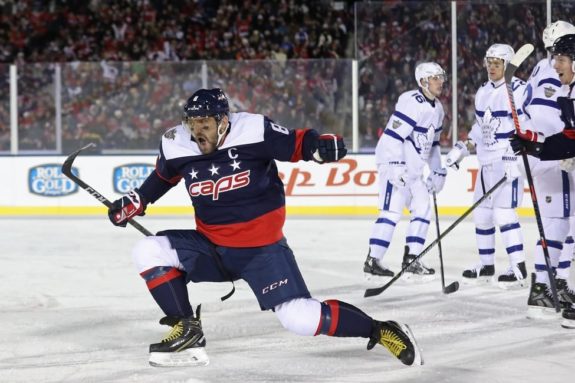
His game was forced to change when the Capitals hired Barry Trotz, previously the head coach of the Nashville Predators, to replace Adam Oates as head coach in May 2014. Trotz is a defensive specialist behind the bench, emphasizing total team defense as the key to winning hockey games—an aspect of the game that the Capitals lacked.
All players had to buy into Trotz’s system and play two-way hockey in order to fit into his game plan, regardless if it meant changing individuals’ styles of play. Ovechkin was no exception, and Trotz flew to Las Vegas upon being hired to meet his captain at the 2014 NHL Awards and discuss his expectations for him as a leader and an all-around player going forward (from ‘At NHL awards, focus on Alex Ovechkin meeting new Caps coach Barry Trotz,’ Washington Post, 06/23/2014). If Ovechkin was going to become an effective captain, he had to lead by example and improve his defensive game without impeding on his offensive game.
There was certainly a feeling-out process between the captain and his new coach, but Trotz’ defensive impact was instantly noticeable (from ‘Barry Trotz returns to scene of the sublime, and Alex Ovechkin is happy to see him,’ Washington Post, 06/17/2019). The team saw its numbers improve in many defensive areas during his first season in charge. For example, as seen in the graph below, the total number of shots that opponents averaged against Washington per 60 minutes (Corsi against per 60) decreased for the first time in years, dropping from 57 in Oates’ final season behind the bench (2013-14) to nearly 52 during Trotz’ inaugural season in D.C. (2014-15).
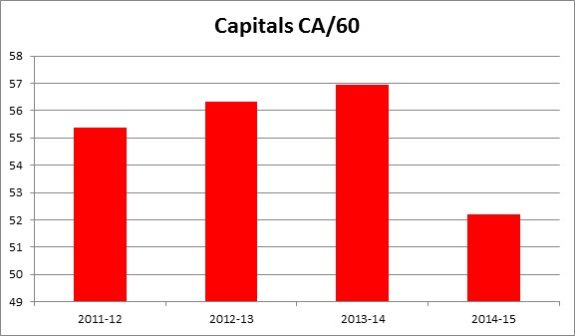
With Trotz at the helm, Ovechkin began to thrive defensively and shape into a more well-rounded, two-way player. At first, he saw his ice time diminish due to his lackluster defensive work rate when the Capitals held late-game leads. However, he eventually became more reliable during these situations as his defense improved, and he was given the freedom to continue with offensive business as usual as long as he stuck to the defensive game plan, backchecked with his linemates, and gave his opponents little-to-no time and space in the Capitals’ zone.
To analyze his improvement, I’ve compared his regular-season defensive statistics from his five seasons as captain prior to Trotz’s signing (2009-10 to 2013-14) to his regular-season numbers during the Trotz era (2014-15 to 2017-2018).
Here’s a look at his average regular-season defensive numbers before Trotz (including the 2012-13 season where he only played 48 games due to the lockout):
- Plus/Minus (+/-): plus-28
- Blocked shots (BLK): 25
- Defensive Point Shares (DPS): 1.62
- Total Goals Against while on ice (TGA): 56
- Corsi Against at Even Strength (CA): 1,114
Now take a look at Ovechkin’s regular-season defensive statistics during the Trotz era:
- Plus/Minus (+/-): plus-40
- Blocked shots (BLK): 29
- Defensive Point Shares (DPS): 2.1
- Total Goals Against while on ice (TGA): 59.8
- Corsi Against at Even Strength (CA): 1,213
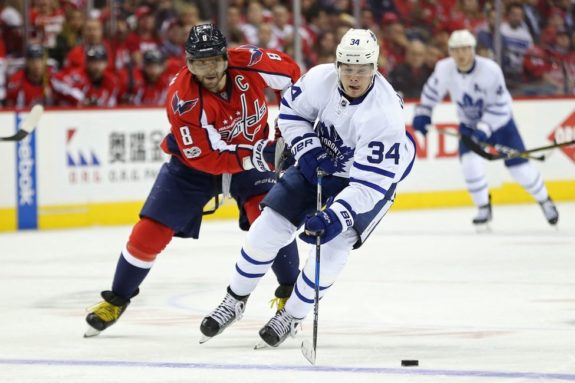
Although it may seem that some statistics worsened under Trotz like TGA and CA, keep in mind that Ovechkin’s numbers from the 2012-13 season factor into the first group of numbers. If he played 82 games instead of 48 that season, he would have ended up with an estimated plus-29, 28 BLK, 1.76 DPS, 62 TGA, and 1,226 CA during the five seasons before Trotz. With that being said, Trotz’s defensive impact on Ovechkin and the Capitals’ defensive styles is as clear as day.
In the end, Ovechkin bought into his Trotz’s system and took significant strides to improve the defensive aspect of his game and lead by example—all while continuing to lead the league in goal scoring. Adding a defensive element to his game has ultimately been beneficial to both him as a player and captain, and also to the team as a whole. Although current head coach Todd Reirden does not play as defensively as his predecessor, Ovechkin still continues to backcheck hard and impress on both ends of the ice as captain.
Maturity and Discipline
When the “C” was added to Ovechkin’s jersey as a 24-year-old, it’s safe to say that he probably wasn’t mature or disciplined enough to be the leader of the Capitals. He could be described as reckless and hot-headed, hitting anyone who moved in front of him regardless of the situation, letting his temper and emotions get the best of him, and taking a number of unnecessary penalties.
As was the case with his two-way game, Trotz stepped in during his time in the nation’s capitals to help shape his captain into a much more disciplined leader. His impact, again, was instantly noticeable. During Trotz’s first season, Ovechkin began to retaliate less to opponents’ actions, knowing he had to stay out of the penalty box. Take a look at how he ignores Chris Kunitz’s and David Perron’s series of cross-checks during the third period against the Pittsburgh Penguins in Feb. 2015 at a time when tempers were flaring on both sides:
Ovechkin most likely would have retaliated and have been penalized for his actions if this occurred earlier in his career and captaincy. However, Trotz ingrained it in Ovechkin’s mind that he needs to stay out of the penalty box if he was going to lead the team and win hockey games, especially when it comes to petty, unnecessary penalties.
Here’s what Trotz said Ovechkin’s penalty habits during the 2016-17 season when he had been called for six minors penalties in a five-game stretch:
“He understands the best way to help the team is to not be in the penalty box. Especially some of the stick penalties and stuff, he can get those out of his game. He knows that. We need him on the ice. He knows that we need him on the ice. That’s where he’s going to be most productive. So he knows as a leader of our team he can’t be putting us down in terms of being a man short as often as he has lately.”
The Washington Post
Ovechkin acknowledged that he needed to change his habits and eliminate them from his game altogether:
“Obviously, I have to be on the ice and not in the penalty box,” he said. “It’s a good thing we talk. It’s my mistakes, and I just have to handle it and don’t take those penalties.”
The Washington Post
Trotz also taught Ovechkin that he was going to be held accountable for his actions as captain. This was evident when Trotz benched Ovechkin for missing a morning skate two games into the 2015-16 season, teaching him to set his alarm clock to A.M. instead of P.M. and to own up to his mistakes.
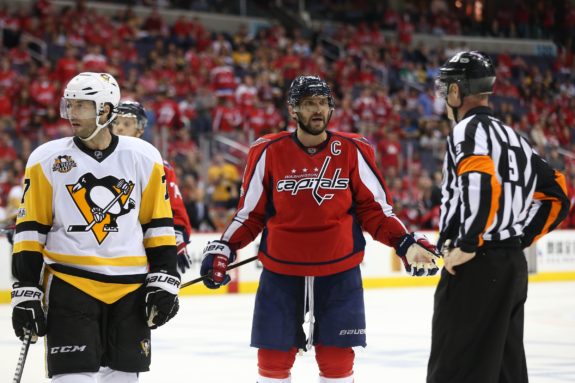
Ovechkin, without a doubt, became a much more disciplined player and leader for the Capitals during the Trotz era, and his numbers prove it. Ovechkin recorded 58 penalties in minutes (PIM) the year Trotz took over, but steadily decreased that number to 32 by the end of the 2017-18 season—his lowest total in six seasons. His number of hits also decreased as he became more disciplined and developed into a selective hitter, decreasing his numbers from 259 hits in the 2014-15 seasons to 139 in Trotz’s last year.
Ovechkin has managed similar statistics with Reirden in charge the past two seasons. He recorded 40 PIM and 223 hits last season, and he has tallied 22 PIM and 122 hits through 43 games this season. Although his temper can still get the better of him from time to time, Ovi has improved his temperament and discipline by leaps and bounds over his ten years as captain.
Team-First Mentality
Above everything, Ovechkin has become a total team player for the Capitals. Early in his career, Ovechkin prioritized his own number and personal achievements over those of the team. You can’t really blame him, either, as he went on to win the Calder Memorial Trophy, three Hart Memorial Trophies, three Ted Lindsay Awards, and four Maurice “Rocket” Richard Trophies between the 2005-06 and 2013-14 seasons. As captain, however, it’s imperative to put the team’s interests before your own, and that mentality is something he had to develop over his ten-year tenure—particularly while under Trotz.
Ovechkin has taken strides to improve his passing game as captain. Other than scoring an incredible amount of goals each season, Ovi has been sharing the puck more than he used to, and he has been recording around a consistent 30 assists per season the past eight-to-nine seasons. Although his passing improvement might not be noticeable in his statistics, it’s certainly seen on the ice.
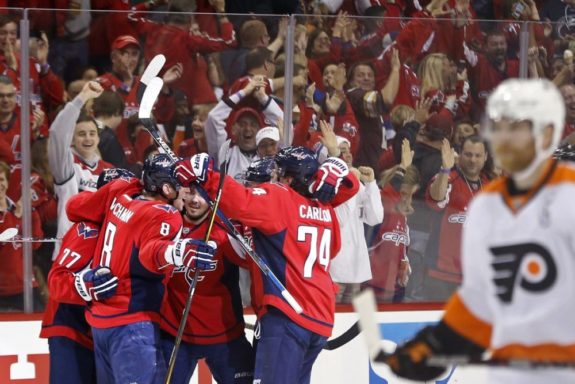
He has also become a vocal leader. He can be seen constantly talking to his teammates in the locker room, on the bench, and on the ice—a quality he lacked early in his captaincy. Recently, Reirden praised Ovi for taking charge during practice and encouraging the team to start a drill over and run it correctly. (from ‘Alex Ovechkin reminisces on 10 years as Capitals’ captain,’ Washington Post, 01/04/2020)
Most importantly, Ovechkin learned that he had to make sacrifices as the leader of the team with Trotz behind the bench, even if those changes did not benefit himself and his personal numbers. He was particularly challenged with this during the 2016-17 season when he saw his ice time diminish to a career-low 18:22 in order to rest for the playoffs and even the quality and playing time of all four lines. Also during that season, Ovechkin accepted a third-line role in the second round of the playoffs in order to balance the Capitals’ offensive approach. (from ‘Alex Ovechkin sent a message by accepting third-line role — and his teammates ‘loved it’,’ Washington Post, 05/09/2017)
Here’s what Trotz had to say about Ovechkin’s performance as a leader that season:
“I don’t think anything personally for him really matters, which is a great sign really,” Trotz said before the playoffs. “I think early in his career, he was chasing records. … He’s realizing the importance of his teammates. He’s realizing the importance of doing something together with the group rather than individual stuff.”
The Washington Post
Most recently, Ovechkin sacrificed his NHL All-Star Game nomination for the second-straight season in order to rest longer during the All-Star break in preparation for the playoffs. He has placed the Capitals’ needs and interests before his own, and it has, without a doubt, paid off for both him and the organization.
The post Ovechkin’s Decade as Capitals’ Captain appeared first on The Hockey Writers.
Popular Articles

















































 Canucks Vancouver
Canucks Vancouver Sharks San Jose
Sharks San Jose Flames Calgary
Flames Calgary Avalanche Colorado
Avalanche Colorado Coyotes Arizona
Coyotes Arizona Golden Knights Vegas
Golden Knights Vegas Wild Minnesota
Wild Minnesota Red Wings Detroit
Red Wings Detroit Blues St. Louis
Blues St. Louis Blackhawks Chicago
Blackhawks Chicago Blue Jackets Columbus
Blue Jackets Columbus Hurricanes Carolina
Hurricanes Carolina Jets Winnipeg
Jets Winnipeg Predators Nashville
Predators Nashville Ducks Anaheim
Ducks Anaheim Oilers Edmonton
Oilers Edmonton Sabres Buffalo
Sabres Buffalo Rangers New York
Rangers New York Bruins Boston
Bruins Boston Panthers Florida
Panthers Florida Senators Ottawa
Senators Ottawa Lightning Tampa Bay
Lightning Tampa Bay Capitals Washington
Capitals Washington Islanders New York
Islanders New York Devils New Jersey
Devils New Jersey Maple Leafs Toronto
Maple Leafs Toronto Flyers Philadelphia
Flyers Philadelphia Penguins Pittsburgh
Penguins Pittsburgh Stars Dallas
Stars Dallas Kraken Seattle
Kraken Seattle Kings Los Angeles
Kings Los Angeles






